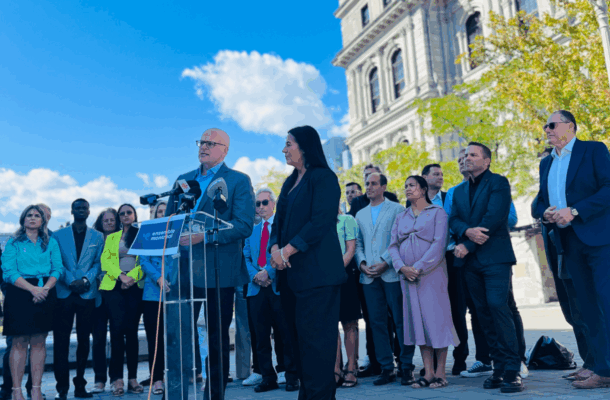
Ensemble Montréal, B’nai B’rith and the Centre for Research-Action on Race Relations (CRARR) joined forces today at a press conference to call for more action to combat hate incidents and crimes. During the meeting, Montréal’s Official Opposition announced that it will table a motion at the next City Council meeting to ask Montréal’s SPVM police service to pay more attention to this issue.
While the SPVM’s annual report shows a worrying increase in incidents (+107%) and crimes (+53%) based on race, ethnicity and skin colour between 2019 and 2020, these data are all the more disturbing because they represent only the tip of the iceberg. For one thing, online hate incidents are not included in the SPVM’s annual report. On the other hand, only 1% of hate incidents, speeches and crimes in Canada are reported to police, according to the Canadian Race Relations Foundation.
Convinced that by better understanding the extent of the problem, we will be able to stop it, Ensemble Montréal is asking the SPVM to improve its web tools for reporting crime to make them more accessible, in addition to training and sensitizing its staff on the legal aspects and psychological impacts of hate crimes and incidents. Although residents can currently fill out an online report on the SPVM website, in the end they are always referred back to 911 when submitting the form. This can be problematic as victims may not feel comfortable speaking out, or may feel that these acts are not important enough to bother the authorities.
The motion also requests that the City of Montréal urge the Government of Canada to quickly adopt the recommendations of the House of Commons Standing Committee on Public Safety and National Security’s report on the rise of ideological violent extremism in Canada.
Quotes:
“Social isolation and the strong influence of social networks have favoured a rise in hateful acts toward cultural communities, among other things. However, the judicial system and police responses have yet to adapt to this reality. There are many structural bottlenecks. We need to give ourselves tools, both to encourage whistleblowing and to deal with complaints,” said Sonny Moroz, Ensemble Montréal City Councillor for the Snowdon district.
“We need to send a strong signal to both victims and perpetrators that hate crimes and incidents are taken seriously by authorities. It’s not always obvious to police officers when to intervene, and that’s why training and awareness are crucial,” said Alba Zúñiga Ramos, Ensemble Montréal City Councillor for the Louis-Riel district.
“The face of hate has changed in Canada and now is largely propelled online. Councillor Moroz’s motion is important in that it calls for more resources, better tools to report and record hate crimes and incidents and endorses the important recommendations of the House of Commons Standing Committee on Public Safety and National Security calling for legislation to enhance Canada’s tools to fight online hate. For us, this last point is crucial. Canada’s legislation is clearly out of date,” added Marvin Rotrand, B’nai B’rith’s national director of the League for Human Rights.
“The SPVM needs to be more proactive in reaching out to community members most vulnerable to hate crimes, gaining their trust and helping them file complaints, especially those who experience social and language barriers and are unaware of their rights,” explained Fo Niemi, executive director of the Centre for Research-Action on Race Relations.




